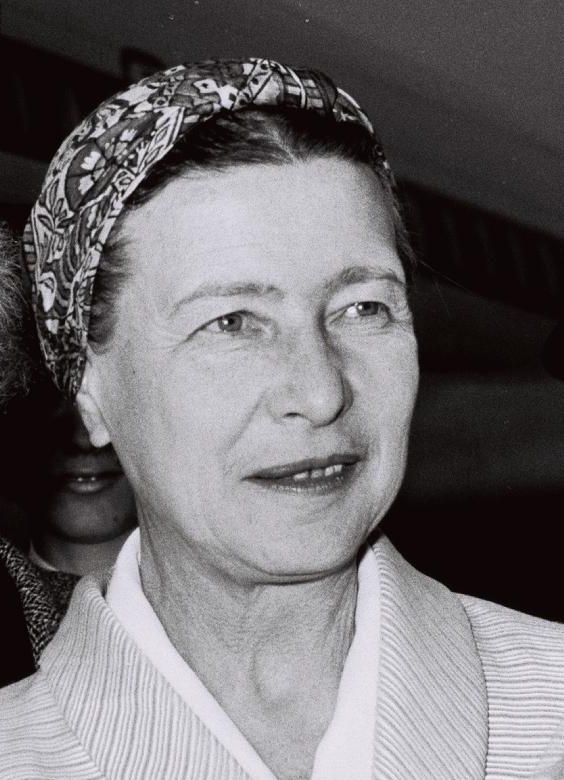- Humanities
- 23 de September de 2025
- No Comment
- 9 minutes read
Simone de Beauvoir in Moscow

Simone de Beauvoir in Moscow


When a writer travels somewhere without intending to prove a point—like Montserrat Roig, who described both drunks and golden treasures—it is often possible for them to observe enough detail to produce a viable travel account. In the 1960s, Simone de Beauvoir offered us some remarkably precise impressions of Moscow and other parts of the Soviet Union. However, she did not frame them in a journalistic or diary-style narrative. Instead, they appear in her novel Misunderstanding in Moscow (1966–67), a remarkable exercise in introspection. A few years ago, Navona republished the work in a Catalan translation by August Rafanell.
With only the barest thread of a plot—a now elderly French couple travel to the USSR to spend a month with Macha, the Russian daughter the husband fathered during a previous relationship—what unfolds before the reader is a meditation on bodily decline, the disillusionments of middle age, the condition of being a woman, and the nature of memory and the past. And all of this unfolds without a single cliché about love, sex, or child-rearing.
Thus, we are far from dealing with a colourful, picturesque narrative. And yet Beauvoir’s sketches and depictions of Soviet cities rank among the most vivid of that era. One might say she knew Moscow intimately, because she breathed as the city breathed:
“The railway station, painted in a garish green: Muscovite green. (‘If you don’t like that, then you don’t like Moscow,’ André had said three years earlier). Gorky Street. The Peking Hotel: a modest tiered wedding cake, when you compared it with the gigantic, ornate buildings allegedly inspired by the Kremlin, with which the city was bristling. Nicole remembered everything. And as soon as she got out of the car, she recognised the smell of Moscow—an even stronger smell of diesel fumes than in 1963, doubtless because there were far more vehicles, especially trucks and vans”.
These fragments of Soviet reality foreshadow the fictional world of Sergei Dovlatov—the Russia where few people believed in much of anything anymore, and where the moralising of the KGB had taken the place of murderous excess. In such a world, it became possible to take ironic refuge in a kind of half-existential, half-alcoholic indifference. In the Khrushchev years, there was still a youngish minority fighting for cultural “liberalism” against post-Stalinist “academicism”. A faint hope lingered that all might yet be put right, even though the system, bureaucratically ossified, was incapable of producing school chairs or ensuring the most basic supplies.
The burdens and implausible restrictions imposed on foreigners were still in place:
“That was what had disconcerted them in 1963. Standing in line —in front of the Mausoleum, at the GOUM, or at the door of restaurant— Macha had only to say a word for people to step aside to let them through. Yet in the Crimea they had come across prohibitions everywhere: the east coast and Sevastopol were prohibited areas for foreigners. Intourist had claimed that the mountain road linking Yalta to Simferopol was being repaired, but Macha had been told in confidence that it was, in fact, closed only to foreigners”.
This is what it means to truly know a place and its people at a given historical moment: to know its roads, its rumours, its flowers and smoke—without filters or abstract distortions.
Beauvoir adds her voice to a commonly shared observation among travellers who visited the Soviet Union more than once: the country was evolving rapidly, in fits and starts:
“Moscow had changed a little, was somewhat uglier. (What a pity that changes are almost always for the worse, for places as well as for people). They had discovered some avenues for the first time, gone all over ancient quarters of the city. Red Square, closed to motor vehicles, seemed bigger and more solemn: a holy place. Unfortunately, whereas St Basil’s Church used to rise up into the sky, a huge hotel behind it now blocked off the horizon”.
Could it be that this novel—about faded memories, lost illusions, wrinkled bodies and souls numbed by the Algerian War—was meant to draw a parallel between the decline of the Soviet world, riddled with contradiction, and the decline of those who had once believed in it, in both material and bodily terms?
“On the previous day, in Vladimir, there was a food shortage. The restaurant was not serving fish, or mutton, or poultry, or vegetables, or fruit: just stews that Nicole and Macha found inedible. The bread, which was neither white nor black, tasted like glue. In front of the hotel, people were lining up to buy pancakes hard enough to break your teeth. And there they were this morning, with women coming out of the pavilion loaded with garlands of pretzels and their shopping bags stuffed full of food. They ordered cakes and egg and cheese sandwiches, which were excellent”.
This was the more or less accepted chaos, the constant contradiction, which Macha—accurately—attributes to bureaucratic sclerosis.
The city, undoubtedly, seemed sadder, and somewhat dirtier and harder to make sense of:
“Many cafés had been built In the intervening three years. With their glass walls they were not ugly from the outside, but inside they were like cheese shops, lacking in comfort and intimacy”.
André and Macha—father and daughter, though near strangers—argue incessantly about politics. For the father, socialism is an abstract struggle, driven by principles; Macha, who lives in Moscow, defends the existence of light industry and a culture of comfort. It seems the author had grown tired of it all: of the epic struggles of the 1920s and 1930s, and of their lingering ghosts half a century on.
“Yet, if the USSR settled down to peaceful co-existence, socialism would be a long time coming. How many hopes had been disappointed! The Popular Front, the Resistance In France; and the emancipation of the Third World, which had not pushed back capitalism by a single inch”.
The threat of nuclear war hangs in the air: Macha wishes to support international socialism, but not at the cost of mass destruction. Historians tell us that not five years earlier, Khrushchev had refrained from pushing the nuclear button—perhaps because, as a true Marxist, he wanted to live to see the USA converted to communism, not reduced to ashes. To destroy it would have been a kind of failure. Castro had even written to him, demanding the obliteration of half the world in a matter of minutes…
Beauvoir managed to round off a novel that is either philosophically poetic or poetically philosophical, with genuinely visionary fragments:
“It would be fine, he often thought, if the past were a landscape in which one could wander at will, discovering little by little how routes meander and double back. But this was not so. He could recite names and dates in the way that a schoolboy recites a well-learned lesson. He had a certain knowledge, and some distorted, faded images, as static as those in an old history book – they sprang up, at random, against a blank background”.
To make matters worse, André no longer remembers much of his past struggles, experiences or cultural aspirations. Of his formerly active intellectual life, almost nothing seems to remain. By the end of her life, Simone de Beauvoir appears to have become sharply critical of the Soviet Union’s lack of civil liberties.
Source: educational EVIDENCE
Rights: Creative Commons

